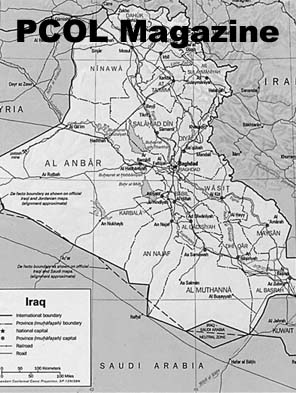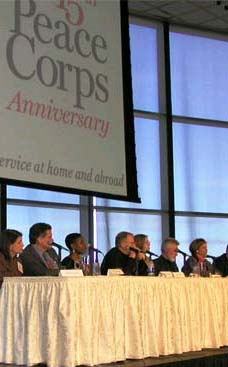2006.03.27: March 27, 2006: Headlines: Speaking Out: Iraq: Independent: Ivan Eland says: The Bush administration is now suffering for its shocking failure to learn the lessons of the tragedy of Vietnam
Peace Corps Online:
Directory:
Tunisia:
Special Report: Diplomat Edmund Hull:
April 4, 2005: Index: PCOL Exclusive: RPCV Edmund Hull (Tunisia) :
2006.03.07: March 7, 2006: Headlines: Figures: COS - Tunisia: Diplomacy: Springfield State Journal Register: Hull says patience will win war on terrorism :
2006.03.27: March 27, 2006: Headlines: Speaking Out: Iraq: Independent: Ivan Eland says: The Bush administration is now suffering for its shocking failure to learn the lessons of the tragedy of Vietnam
Ivan Eland says: The Bush administration is now suffering for its shocking failure to learn the lessons of the tragedy of Vietnam

"The U.S. military, since the days of U.S. Grant, has used superior firepower to win wars of attrition against its enemies. In Vietnam, the U.S. military used such tactics initially, but later adopted a softer counterinsurgency strategy only after it was too late. The Bush administration initially blasted towns like Falluja into rubble and only now, in an attempt to reduce support for the guerillas among the already angry population, is converting to a strategy aimed at winning Iraqi hearts and minds."
Ivan Eland says: The Bush administration is now suffering for its shocking failure to learn the lessons of the tragedy of Vietnam
Top Ten Mistakes the Bush Administration Is Repeating from Vietnam
March 27, 2006
Ivan Eland
Because the Bush administration, almost from the start, has eschewed any comparison of Iraq with Vietnam, officials apparently never read the history of the nation’s heretofore worst war and have made the same 10 major mistakes:
1. Underestimating the enemy. As in Vietnam, the superpower’s potent military has been astounded by the tenacity and competence of a nationalist rebellion attempting to throw a foreign occupier from its soil. For example, the U.S. military, a hierarchical organization, views the Sunni insurgency as disorganized and without a central command structure. Yet the insurgents are using this decentralized structure very effectively and are not threatened by any U.S. decapitation strike to severely wound the rebellion by killing its leaders.
2. Deceiving the American public about how badly the war is going. President Bush continues to talk of victory, and his chief military officer, Gen. Peter Pace, argued that the United States was making “very, very good progress” just two days before the more credible U.S. ambassador to Iraq warned that a civil war was possible in Iraq. President Lyndon Johnson painted an excessively rosy picture of U.S. involvement in Vietnam until the massive communist Tet offensive against the south in 1968 created a “credibility gap” in the public mind. The U.S. and South Vietnamese militaries successfully beat back the offensive, but the war was lost politically because the U.S. government lost the confidence of its own citizens. The Bush administration has fallen into the same trap by trying to “spin” away bad news from Iraq. Polls ominously indicate that Bush’s trustworthiness in the eyes of the American public has plummeted more than 20 points since September of 2003 to 40 percent.
3. The Bush administration, like the Johnson and Nixon administrations, blames the media’s negative coverage for plunging popular support of the war. Yet the nature of the press is that it would rather cover extraordinary negative events, such as fires and plane crashes, than more mundane positive developments. Vietnam demonstrated that normal media coverage of mistakes in war could undermine the war effort. The Bush administration should have expected such predictable media coverage.
4. Artificial government statistics cannot be used to measure progress in a counterinsurgency war. In Vietnam, the body counts of North Vietnamese/Viet Cong were always much greater than U.S./South Vietnamese deaths. Lately, the Bush administration has touted that fewer U.S. personnel are dying in Iraq. But U.S. forces have been pulled back from the fight to reduce U.S. casualties and to train Iraqi forces. In guerilla warfare, despite unfavorable statistics, as long as the insurgents keep an army in the field, they can win as the foreign invader tires of the occupation.
5. The initial excessive use of force in counterinsurgency warfare instead of a plan to win hearts and minds. The U.S. military, since the days of U.S. Grant, has used superior firepower to win wars of attrition against its enemies. In Vietnam, the U.S. military used such tactics initially, but later adopted a softer counterinsurgency strategy only after it was too late. The Bush administration initially blasted towns like Falluja into rubble and only now, in an attempt to reduce support for the guerillas among the already angry population, is converting to a strategy aimed at winning Iraqi hearts and minds.
6. Failed “search and destroy” tactics belatedly gave way to the “inkblot” approach of clearing and holding ground. In both Vietnam and Iraq, after search and destroy missions, enemy fighters merely returned to areas when “victorious” U.S. forces left. But not enough U.S. forces are in Iraq to make the “clear and hold” method work.
7. “Iraqization” of the war parallels the unsuccessful “Vietnamization” in the 1970s. The Nixon administration never fully explained how the less capable South Vietnamese military could defeat the insurgency when the powerful U.S. military had failed. The same problem exists in Iraq.
8. As in Vietnam, there has been no “date certain” for withdrawal of U.S. forces. President Bush recently implied that U.S. forces would be in Iraq when the next president takes office. Such an indefinite commitment of U.S. forces convinces more Iraqis that the United States is an occupier that needs to be resisted.
9. Retention of incompetent policymakers. Lyndon Johnson retained Robert McNamara, the inept architect of the Vietnam strategy, as Secretary of Defense until McNamara himself turned against his own war. Bush has kept the bungling Donald Rumsfeld on too long in the same position.
10. Most important of all, starting a war with another country for concocted reasons, which did not hold up under scrutiny. Lyndon Johnson used a questionable alleged attack by Vietnamese patrol boats on a U.S. destroyer to escalate U.S. involvement in a backwater country that was hardly strategic to the United States. Bush exaggerated the dangers from Iraqi weapons programs and implied an invented link between Saddam Hussein and the 9/11 attacks. In a republic, the lack of a compelling rationale for sending men to die in a distant war can be corrosive for the morale of the troops and public support back home.
The Bush administration is now suffering for its shocking failure to learn the lessons of the tragedy of Vietnam.
Ivan Eland is a Senior Fellow at The Independent Institute, Director of the Institute’s Center on Peace & Liberty, and author of the books The Empire Has No Clothes, and Putting “Defense” Back into U.S. Defense Policy.
When this story was posted in March 2006, this was on the front page of PCOL:





Peace Corps Online The Independent News Forum serving Returned Peace Corps Volunteers
 | History of the Peace Corps
PCOL is proud to announce that Phase One of the "History of the Peace Corps" is now available online. This installment includes over 5,000 pages of primary source documents from the archives of the Peace Corps including every issue of "Peace Corps News," "Peace Corps Times," "Peace Corps Volunteer," "Action Update," and every annual report of the Peace Corps to Congress since 1961. "Ask Not" is an ongoing project. Read how you can help. |
 | The Peace Corps Library
The Peace Corps Library is now available online with over 40,000 index entries in 500 categories. Looking for a Returned Volunteer? Check our RPCV Directory. New: Sign up to receive PCOL Magazine, our free Monthly Magazine by email. Like to keep up with Peace Corps news as it happens? Sign up to recieve a daily summary of Peace Corps stories from around the world. |
 | Peace Corps suspends program in Bangladesh
Peace Corps Director Gaddi H. Vasquez announced the suspension of the Peace Corps program in Bangladesh on March 15. The safety and security of volunteers is the number one priority of the Peace Corps. Therefore, all Peace Corps volunteers serving in Bangladesh have safely left the country. More than 280 Peace Corps volunteers have served in Bangladesh since the program opened in November 1998. Latest: What other newspapers say. |
 | Invitee re-assigned after inflammatory remarks
The Peace Corps has pulled the invitation to Derek Volkart to join the Morocco Training Program and offered him a position in the Pacific instead after officials read an article in which he stated that his decision to join the Peace Corps was in "response to our current fascist government." RPCV Lew Nash says that "If Derek Volkart spoke his mind as freely in Morocco about the Moroccan monarchy it could cause major problems for himself and other Peace Corps volunteers." Latest: Volkart reverses stance, takes new assignment in Paraguay. |
 | March 1, 1961: Keeping Kennedy's Promise
On March 1, 1961, President John F. Kennedy issues Executive Order #10924, establishing the Peace Corps as a new agency: "Life in the Peace Corps will not be easy. There will be no salary and allowances will be at a level sufficient only to maintain health and meet basic needs. Men and women will be expected to work and live alongside the nationals of the country in which they are stationed--doing the same work, eating the same food, talking the same language. But if the life will not be easy, it will be rich and satisfying. For every young American who participates in the Peace Corps--who works in a foreign land--will know that he or she is sharing in the great common task of bringing to man that decent way of life which is the foundation of freedom and a condition of peace. " |
 | Paid Vacations in the Third World?
Retired diplomat Peter Rice has written a letter to the Wall Street Journal stating that Peace Corps "is really just a U.S. government program for paid vacations in the Third World." Director Vasquez has responded that "the small stipend volunteers receive during their two years of service is more than returned in the understanding fostered in communities throughout the world and here at home." What do RPCVs think? |
 | RPCV admits to abuse while in Peace Corps
Timothy Ronald Obert has pleaded guilty to sexually abusing a minor in Costa Rica while serving there as a Peace Corps volunteer. "The Peace Corps has a zero tolerance policy for misconduct that violates the law or standards of conduct established by the Peace Corps," said Peace Corps Director Gaddi H. Vasquez. Could inadequate screening have been partly to blame? Mr. Obert's resume, which he had submitted to the Peace Corps in support of his application to become a Peace Corps Volunteer, showed that he had repeatedly sought and obtained positions working with underprivileged children. Read what RPCVs have to say about this case. |
 | Why blurring the lines puts PCVs in danger
When the National Call to Service legislation was amended to include Peace Corps in December of 2002, this country had not yet invaded Iraq and was not in prolonged military engagement in the Middle East, as it is now. Read the story of how one volunteer spent three years in captivity from 1976 to 1980 as the hostage of a insurrection group in Colombia in Joanne Marie Roll's op-ed on why this legislation may put soldier/PCVs in the same kind of danger. Latest: Read the ongoing dialog on the subject. |
 | Friends of the Peace Corps 170,000 strong
170,000 is a very special number for the RPCV community - it's the number of Volunteers who have served in the Peace Corps since 1961. It's also a number that is very special to us because March is the first month since our founding in January, 2001 that our readership has exceeded 170,000. And while we know that not everyone who comes to this site is an RPCV, they are all "Friends of the Peace Corps." Thanks everybody for making PCOL your source of news for the Returned Volunteer community. |
Read the stories and leave your comments.

Some postings on Peace Corps Online are provided to the individual members of this group without permission of the copyright owner for the non-profit purposes of criticism, comment, education, scholarship, and research under the "Fair Use" provisions of U.S. Government copyright laws and they may not be distributed further without permission of the copyright owner. Peace Corps Online does not vouch for the accuracy of the content of the postings, which is the sole responsibility of the copyright holder.
Story Source: Independent
This story has been posted in the following forums: : Headlines; Speaking Out; Iraq
PCOL32243
56


















